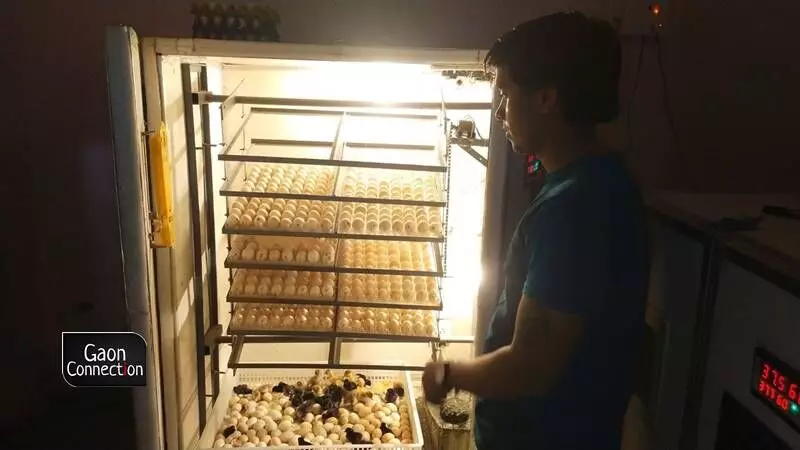Satna, Madhya Pradesh
Kadaknath chicken farming is a growing business in India and several rural youth are coming forward to take up Kadaknath (black chicken) farming, which is profitable as it gives quick returns, and Kadaknath meat is preferred by the health conscious.
Twenty-eight-year-old Vipin Sihore is one such poultry farmer from Jhukehi village in Satna district, Madhya Pradesh, who took up Kadaknath rearing during the lockdown and now has a flourishing business.
“I had started the business with an investment of two lakh rupees where I bought 200 female and 20 male chickens. Today I have nearly 12,000 Kadaknath chickens,” Sihore said. Meanwhile, his chickens have also been exported to Bahrain for a business worth Rs 70,000, he said.
Also Read: A Bed of Roses in Drought-Prone Solapur
But, to begin with, it wasn’t an easy journey. There is little Sihore had not tried his hand at in order to earn a livelihood to support his family.
His family was poor because of which he only studied till class twelve, after which he set out to find a job. He worked at a restaurant in Mumbai, first as a food packer, a waiter, then at the bill counter before being promoted to the post of a manager. From starting off with a salary of Rs 1,600 a month, Sihore began to take home Rs 9,000 a month, and then Rs 16,000 a month, all in four years. Things were going well. Sihore managed to send money home, got his sister and brother married off and built a home in his village.
But then, the pandemic happened and he lost his job in 2020. He lingered on in Mumbai, sold vegetables for a while before he got COVID-19 and was forced to return to Jhukehi, his village.
For a long time Sihore cast about for a suitable job when he remembered a friend who raised Kadaknath chickens. Recognising the increasing demand for chicken in the country, as during the pandemic people realised the several health benefits of Kadaknath meat over the broiler chicken, Sihore decided to raise them too.
Also Read: An all woman farmers’ company scripts success in Tamil Nadu’s Salem
But he had no money on him. He borrowed Rs 2 lakh from a bank and armed with information about Kadaknath rearing from the internet, he started a business selling Kadaknath chickens.

For a long time Vipin Sihore cast about for a suitable job when he remembered a friend who raised Kadaknath chickens.
Kadaknath chickens are reared by tribal communities in Bhil and Bhilala in the districts Jhabua and Dhar in the state of Madhya Pradesh. Kadaknath chicken is famous for its meat quality, texture and taste, and medicinal property. Its demand is growing across several states in the country due to the high medicinal values.
Sihore bought Kadaknath chicks from Jhabua at Rs 900 per bird. Initially it was very difficult to read the chicks due to lack of funds. There were times, the poultry farmer said, when they had to borrow money to feed the chicks.
Meanwhile, Sihore uploaded a video of himself raising the chicks on YouTube and in a few days a trader from Odisha called and paid an advance of a lakh of rupees for the Kadaknath chicks before coming to the village himself to pick them up.
Also Read: Dairy Farming Gets a Fillip in Shopian, Kashmir
Kadaknath is ready for sale in four to six months. It can easily achieve 1.5 kg in five months. The weight of male Kadaknath is 1.5 kg and the female 1 to 1.2 kg. This chicken breed has a good food conversion ratio, and achieves good weight in a short duration time. Also, disease in this breed is low compared to broiler chicken. Due to these reasons, it is a healthy proposition to start Kadaknath rearing business.

Sihore sells the Kadaknath birds at Rs 500 a piece. “The chicks do better than the full grown birds. I sell about 3,000 chicks a month, and I earn about Rs 40,000 from selling adult birds,” Sihore said. The lifespan of a Kadaknath bird is 10 years, he added.
“I am now looking forward to owning my own poultry farm. As of now, I am still on rented premises for which I pay Rs 30,000 a month,” he said.
Sihore, with the help of the animal husbandry department in Satna, has registered a hatchery. But a farm he has acquired is yet to be registered. According to him, the delay is because the farm borders three districts.
This story has been done as part of a partnership with NABARD



















